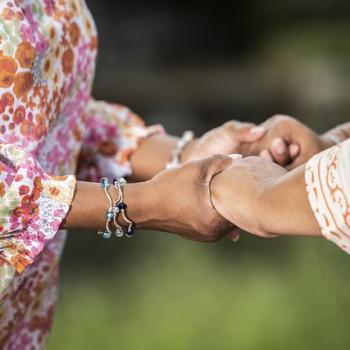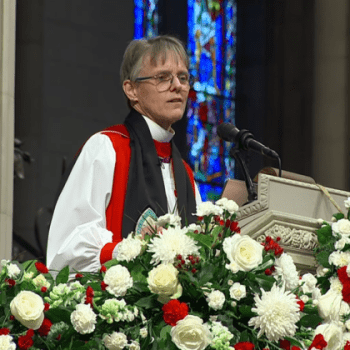Editors' Note: This article is part of the Patheos Public Square on the Future of Faith in America: Islam. Read other perspectives here.
Islamophobia reaching a manageable equilibrium
The future of Islam in America is bright. Even though many American Muslims are reluctant to acknowledge it, there is clearly a uniquely American Islam on the horizon. What is hopeful about this American Islam is that perceptions of it are gradually becoming immune to the violence, the human rights violations, and the political chaos that is perpetrated in the name of Islam in many parts of the Muslim World.
Many Americans today are able to make a distinction between "our Muslims" meaning American Muslims and "those Muslims," meaning Muslims in Europe, Middle East, and generally "over there." This is a gradual development and is apparent from opinion surveys that show low favorability for Islam — which is shaped by realities in the Islamic World — and higher favorability toward American Muslims — because this opinion is shaped by interaction with American Muslims who are generally successful, devout, moderate, and increasingly engaged in interfaith dialogue and volunteerism.
Muslim activists, organizations, and scholars today are scrambling all the time to combat Islamophobic episodes or acts of violence that may engender more hate toward Islam and Muslims. Periodically we have to deal with critical moments — the attacks on soldiers in Fort Hood in 2011, the Boston bombings in 2013, and the Chattanooga shooting in 2015 — that cause setback to our efforts to fight Islamophobia.
Hopefully as American Muslims become more insulated from the negative consequences — Islamophobia — of the political and cultural realities of the Muslim World by distancing themselves from the theological and political proclivities over there, they will become safer and will thrive more than ever before over here. Surveys conducted by Pew have found that opinions of Islam and violence did not change after the attacks on the Boston Marathon in 2013, suggesting that we are reaching equilibrium and this bodes well for the future.
Islamism turning to American exceptionalism
In the 1980s and 1990s politically active American Muslims, mostly new immigrants, were deeply influenced by political Islam and its vision of Islamic revivalism. Many of the Islamic institutions that were established by the American Muslim community in this period, such as the Islamic Society of North America (ISNA) and the Islamic Circle of North America (ICNA), were clearly influenced by Islamic movements in South Asia and the Arab world.
But the rise of Islamophobia in the U.S., and the consistently anti-political Islam discourse in the American public sphere has started eroding the control and influence of political Islam on the culture and politics of American Muslims. This trend began after the aggressive response from American federal agencies to the attacks on the U.S. on September 11, 2001. American Muslim organizations distanced themselves from their mother-movements and also stopped taking funds and donations from Arab governments and private overseas donors. These changes essentially weakened the grip of political Islam on key Muslim organizations and also created an opportunity for politically active Muslims to introduce a new kind of Muslim politics.
This new politics of American Muslims embraces to some extent American exceptionalism and seeks to fight prejudice against Islam and Muslims within the ethical and legal framework of the American Constitution. Additionally there has been a conscious attempt to put the American in American Muslim. Pride in American values of democracy, freedom, and civil rights is shaping this new politics and identity of American Muslims who are moving away from Islamism toward American exceptionalism.
The development of a soft Sufism
Given the strong association of Salafi Islam — which is narrow, literalist, puritanical, and intolerant — with terrorism and groups such as Boko Haram and ISIL, many American Muslim communities and theological leaders are distancing themselves from it. As a result the appeal of Sufi and quasi-Sufi movements and scholars is on the rise among younger generation of American Muslims, as evident from the popularity of gatherings such as Reviving the Islamic Spirit, Islamic singers such as Meher Zain and Sami Yusuf, and rock star imams like Hamza Yusuf.
Unlike traditional Sufism, which tends to revolve around long-standing mystical orders (Tariqas), order specific practices, veneration of saints, and devotional music, America's emerging soft Sufism revolves around the cult of celebrity imams, huge five-star conventions, global spiritual tourism and, this is positive, more a knowledge-oriented approach than traditional Sufism.
I am bullish about the future of American Islam. It will be marked by two trends: the embracing of the American in American Muslims more substantively through enhanced engagement in politics and service locally, and a shift in theological orientation toward a more spiritual Islam.
8/12/2015 4:00:00 AM




